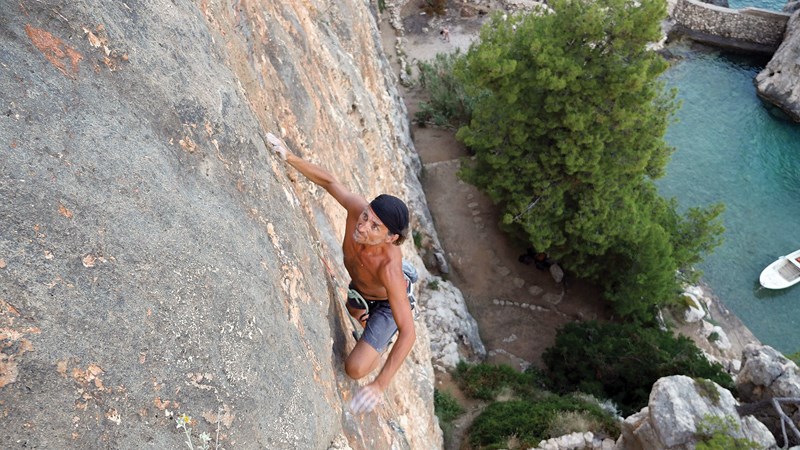20th annual Vancouver International Mountain Film Festival Feb. 10-18. Tickets and info: vimff.org/tickets.
Civilization seemed to be a series of rules that allowed for the full and free flourishing of exploitation.
Growing poor and hungry as productive members of society, one family journeys back to life in giant caves.
Documentary The Last Cavemen chronicles that family as they break off from civilization’s relentless march of progress and search for the Taaw’t Bato, a tribe that has subsisted in the jungles of what is now the Philippines since before the first scrawls and scrolls of recorded history.
As sun streaks through big windows of a bustling Lonsdale coffee shop, festival organizer Alan Formanek ruminates on 20 years of alpine adventure immortalized on 35 millimetre film, videotapes, and iPhones.
In part, the festival was born during Formanek’s days working at Mountain Equipment Co-op on West Broadway in Vancouver, but in some way its roots go back to a bedroom window not too far from the Danube River.
“I could see Austria from my window but we could not go there,” he recalls. “We could not travel to the western countries because it’s the era of socialism and communism.”
He could hike the shambling hills and limestone cliffs in Bratislava, in what is now Slovakia. The hills were fine, but they weren’t mountains.
Those were the days when climbers lived by the pins they hammered into jutting cliff faces.
“When you were leading, you couldn’t really fall,” he remembers.
His father wasn’t “super thrilled” by his son’s new passion, but he relented and let Formanek join a university climbing team at 14.
“I was the youngest climber in the club by far,” he says. “They accepted me and I felt like I was strong, I was one of them.”
He made it to the High Tatras range near the Polish border.
“I finally felt like: ‘This is it.’ It felt so good here.”
He wanted to keep moving. But in the days when wars were cold and curtains were iron, it wasn’t easy.
A trip to Italy and France required permission from Czechoslovakia’s national climbing club, three trips to Prague to get five visas from five separate embassies and one night spent waiting in line at a police station for approval.
Asked if those early trips abroad provided training for organizing film festivals, Formanek takes a moment to think.
“It’s the commitment,” he says.
That commitment is evident as Formanek describes daily life with less than one week before the 20th Vancouver International Mountain Film Festival. He tends to roll out of bed at about 6 a.m. and immediately reply to emails.
“I reply to five emails and by the time I finish I get 10 new emails.”
He’s placing advertising in the North Shore News, finalizing insurance for the venues, overseeing food permits, and making sure each of his 32 scheduled speakers are where they’re supposed to be.
It’s a stark difference from that first festival, when the eclectic crowd of painters, writers and musicians that punched in and out of MEC in the mid-1990s pointed Formanek towards non-profit lawyers and interesting movies.
For that first festival, Formanek recalls rounding up between 25 and 30 movies – mostly shot on VHS – most of which played in front of half-empty theatres.
They had a shortage of sponsors and rented unnecessary equipment, all of which added up to a loss of what Formanek estimates to be “a few thousand” dollars.
“We had no salaries and we lost (money) on top of that.”
Asked why there was a second edition of VIMFF, Formanek offers a simple answer.
“I believed in it.”
Just a few years later VIMFF marked the 50th anniversary of Edmund Hillary and Sherpa Tenzing Norgay’s historic ascent of Everest with presentations by Hillary’s son Peter and mountaineer Jim Whittaker, who led the first United States team that stood on Earth’s rooftop.
Sponsorship picked up, the City and District of North Vancouver offered financial support, and VIMFF turned into a late-winter fixture, boasting films from climbers, surfers, spelunkers, political radicals and radical snowboarders.
“We get submissions from all over the place,” Formanek says. “Filming is much easier and it’s much easier to become a filmmaker.”
Asked if that means there are more bad movies submitted, Formanek nods.
“We get many more films and more good films and more bad films as well.”
While he’s not averse to a few minutes of “ski porn,” Formanek has the same guidelines for film that Bruce Lee had for martial arts: emotional content.
“It’s still the story that needs to touch you,” he says, explaining that the right movie can “change your heart.”



